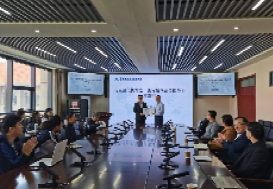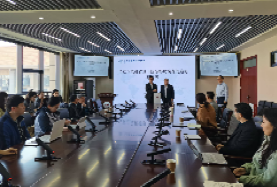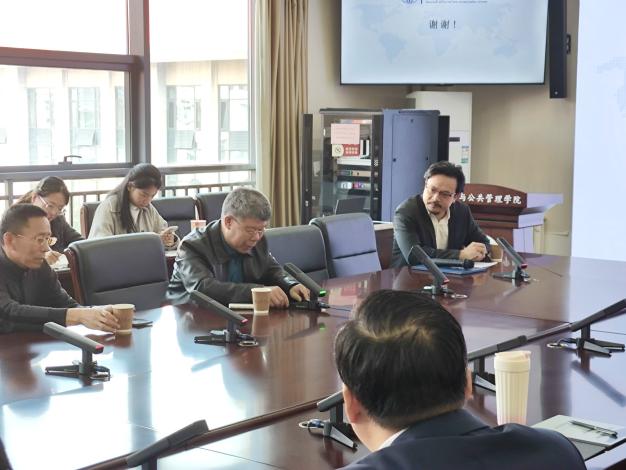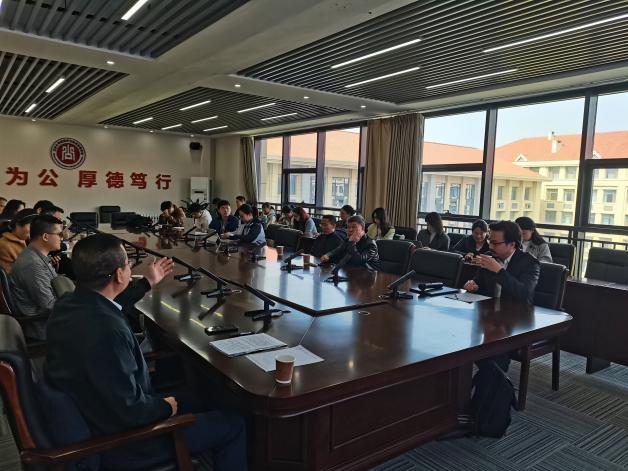On the morning of October 30, the 19th installment of the Cooperation and Development lecture series, jointly hosted by Shandong University's School of Politics and Public Administration, Shandong University's Shanghai Cooperation Organization (SCO) Institute, Shandong University's Institute of Public Safety, and the China-SCO College of Economics and Trade, was successfully held in the conference room on the fourth floor of the South Building of Huagangyuan. The theme of this lecture was "Trends and Impacts of International Structural Evolution in the Context of the Ukraine Crisis," presented by Zhao Long, Deputy Director of the Institute of Global Governance at the Shanghai Institutes for International Studies. Professor Sheng Li, Distinguished Professor at Shandong University's School of Politics and Public Administration and Executive Dean of the SCO Institute, presided over the lecture, with some faculty and students from the School of Politics and Public Administration and the School of Law participating in this academic exchange and discussion.


Before the official start of the lecture, Professor Sheng Li presented Professor Zhao Long with a certificate appointing him as a researcher at Shandong University's SCO Institute, expressing warm welcome to Professor Zhao's joining. Li Haiyan, Secretary of the Party Committee of the School of Politics and Public Administration, also attended the lecture, welcoming Professor Zhao and presenting him with a souvenir.

At the beginning of the lecture, Professor Zhao Long first introduced the current situation of the Ukraine crisis, pointing out that Europe and even the globe have fallen into a deadlock with the Ukraine crisis on "two fronts," with the window for resolving the dilemma hovering between "fighting while negotiating" and a state of "not willing to yield in fighting, unable to afford defeat, and unable to reach a consensus in negotiations" due to the interaction of various forces. Subsequently, he elaborated in detail on the trends in international structural evolution against the backdrop of the current Ukraine crisis, including the transition of changes in the international system from superficiality to essence, the spread of the crisis in regional order from "point to area," the shift of great power rivalry from simplicity to complexity, the transformation of difficulties in global governance from issues to systems, and the accelerated differentiation and reorganization of the world trade landscape. Professor Zhao Long, combining international hot-button issues with a wealth of data and examples, interpreted the complexity and uncertainty of the current international situation in an easy-to-understand manner, and put forward valuable suggestions for China to develop a top-level design for diplomacy, forge an efficient diplomatic landscape, conform to the new themes of the times, and adapt to the new trends in the evolution of the international landscape.


During the interactive Q&A session, faculty and students engaged in lively discussions and exchanges around topics such as the impact of the U.S. general election on the Russia-Ukraine situation, China's role and responsibilities in the international landscape, and the development trends of the future international landscape. Professor Sheng Li expressed gratitude for Professor Zhao Long's presence and sharing, noting that China should maintain strategic focus amidst the current evolution of the international landscape, enhance its internal capabilities, address its shortcomings, and fulfill its responsibilities as a great power.
This lecture provided a platform for participating faculty and students to further understand the changes in the international landscape and adjustments in great power relations under the influence of the current Ukraine crisis. Shandong University's School of Politics and Public Administration is committed to providing high-quality professional discipline resources from both domestic and international sources for faculty and students. The school hopes that its faculty and students will continue to pay attention to school information and the Cooperation and Development lecture series organized by the SCO Institute.
